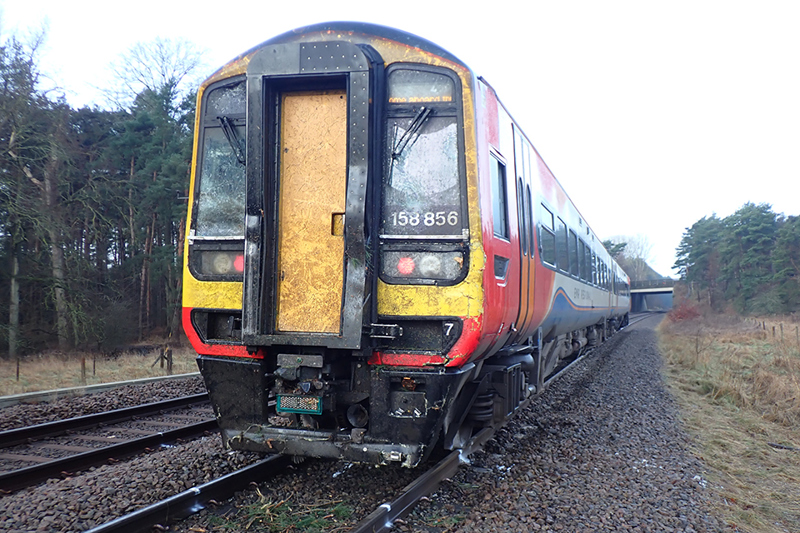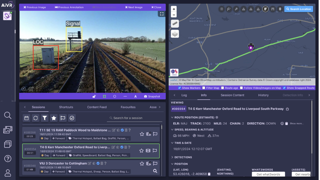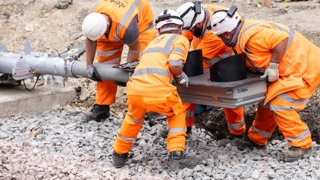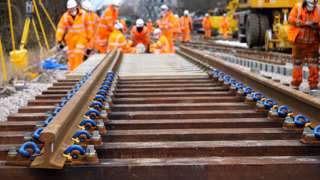
A passenger train derailed after striking two trees that had fallen onto the tracks near Roudham Heath, Norfolk, according to a report released by the Rail Accident Investigation Branch (RAIB).

A passenger train derailed after striking two trees that had fallen onto the tracks near Roudham Heath, Norfolk, according to a report released by the Rail Accident Investigation Branch (RAIB).
The accident happened in the evening of 6 February 2024. The train, a Class 158 operated by East Midlands Railway and running a service between Norwich and Nottingham was travelling at 83 miles per hour when it collided with the trees, which had toppled from a nearby forest owned by Forestry England. The impact caused the train to derail, travelling around 680 metres before coming to a halt. Fortunately, only one of the 31 passengers aboard sustained a minor injury, with no further injuries reported among passengers or crew.
The trees involved were part of a forest adjacent to the track according to the report. The first tree, a twin-stemmed pine, fell onto the line after losing its root anchorage due to “highly saturated, sandy soil”.
According to the report, this pine tree subsequently brought down an adjacent oak tree. The RAIB investigation revealed that the pine's growth pattern, combined with the location of the trees, made it more likely that it would fall onto the railway if it did collapse.
Despite routine inspections by Network Rail and Forestry England, no immediate threat was identified, and no preventative measures were taken.
The RAIB's findings suggest that both organisations failed to adequately manage the risk posed by trees standing in soil saturated by heavy rainfall. The failure to account for soil conditions is being described as a significant underlying factor in the derailment.
As a result of the incident, the train and railway infrastructure suffered damage, and the line was closed for repairs for one day. The RAIB report also highlighted that the collision did not result in significant deformation of the train’s cab, and an axle-mounted brake disc helped keep the train on track during the derailment, preventing more severe consequences.
A Forestry England spokesperson said: “We look after a lot of trees next to railways and remove trees that clearly pose a higher risk. No tree can be guaranteed to remain standing in all weather conditions and it can be very difficult, often impossible, to identify which, if any, might subsequently fall. We note the report’s recommendation and will review our inspection guidelines for trees that are within falling distance of the railway with regards to high soil saturation levels.”
In response to the findings, the RAIB has issued two recommendations. One recommendation calls on Forestry England to review its tree inspection and management processes, particularly in areas where trees are within falling distance of the railway and where soil saturation is a concern. Similarly, Network Rail is advised to enhance its procedures for managing tree risks, considering the impact of saturated soil on the stability of trees near the tracks.
Mark Walker, route infrastructure engineer for Anglia said: "We welcome the report of the Rail Accident Investigation Branch. Since the incident we have worked closely with Forestry England, using aerial drone technology, to identify all the trees through Thetford that pose a risk of falling onto the railway, including third party trees.
"A team of specialist contractors are writing to all adjacent landowners to share this information with them so that an agreed plan of action can be put in place to minimise the risk of similar incidents happening in future.
"Arrangements are being put in place across the rest of the Anglia railway network to target only those trees that pose a risk of falling onto the railway whilst being environmentally responsible and aware of the sensitivities of removing trees in the communities we serve."
Login to continue reading
Or register with RAIL to keep up-to-date with the latest news, insight and opinion.

















Login to comment
Comments
No comments have been made yet.